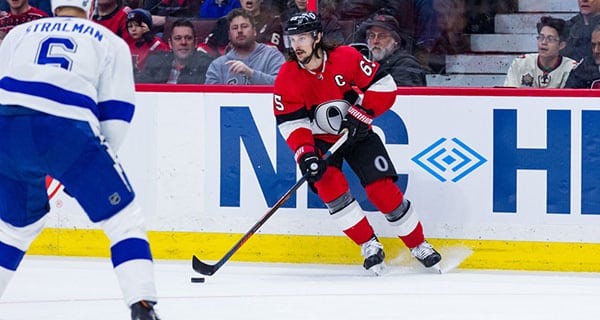 The problem with giving an athlete all the money he’ll ever need is that he’s going to ask you for something you can’t guarantee – no matter how much money you have. And that’s a championship.
The problem with giving an athlete all the money he’ll ever need is that he’s going to ask you for something you can’t guarantee – no matter how much money you have. And that’s a championship.
As the Erik Karlsson drama demonstrated last week, when an athlete gets all the money he can command, he’ll want to play where he can win a title. That wasn’t going to happen title-wise in Eugene Melnyk’s madhouse in Ottawa.
Getting a hometown discount, the Senators might have been able to scratch together enough money to satisfy all Karlsson’s material demands.
But Karlsson wanted to win. And the Senators are the National Hockey League equivalent of Einstein’s futility theory. As currently constituted, they’ll be hard pressed to beat the Carleton University Ravens this season.
And so Karlsson traded in the punching bag for what will certainly be a bag full of loot when the Sharks sign him to a new contract, and a title shot in San Jose. That’s because everyone in sports has lots of money, but only one NHL team in 31 gets a Stanley Cup ring. Ditto the National Football League, where only players on one of 32 teams get a Super Bowl ring. In Major League Baseball, there are 29 also rans and just one World Series winner. And so on.
The LeBron James travelling title circus through Miami, Cleveland and now Los Angeles illustrates the point. James was able to attract wing men to help him in all those cities. Players like Chris Bosh, Kevin Love and Dwyane Wade could have made a little more money staying where they’d been or going to a team desperate for a star. Instead, they hoisted anchor and took less to join LeBron on one of his three NBA championship teams or six NBA Finals squads with the Heat and Cavaliers.
You’re seeing the same in Golden State, where Steph Curry has convinced a stellar cast of NBA stars such as Kevin Durant, Draymond Green, Klay Thompson and DeMarcus Cousins to play for glory with the Warriors on one of their three National Basketball Association winners or four NBA Finals teams.
In MLB, the Red Sox, Dodgers and Yankees are collecting veteran players who thirst to drink from the champagne of champions. There’s money to be made in Pittsburgh or Cincinnati or Kansas City, but your season is effectively over by Labour Day.
More often now, those players are getting company from fans who have way too much sports inventory to sample from and who are looking for something special on the court or the ice.
As I discuss in my new book with Ryan Gauthier, Cap in Hand: How Salary Caps Are Killing Pro Sports and Why the Free Market Could Save Them, the sports industry has morphed since the 1970s and ’80s when the crest on the chest was everything. In those days, the franchise model treated sports like Kentucky Fried Chicken, a commodity to be located in everyone’s home town. There, the leagues could mine new revenue from TV and local advertising.
It’s why we have so many more franchises than we need playing at the top level. Expansion was the watchword. The problem was, how do you get Winnipeg to compete with New York City for talent? The disparities are too great to have 30 or 32 teams all competing equally.
That’s where salary caps and luxury taxes made their appearance. To make star players like Karlsson affordable, stars’ contracts were hammered down to a level that even small markets could afford. The bonus that owners never mentioned was that these restraints also guaranteed almost all of them a profit before they ever opened the doors of the arena or stadium.
To achieve their socialist nirvana, owners cancelled full seasons, half seasons or quarter seasons, denying fans the product while they crushed players into shape. Fans bitched but agreed to the process if it meant a stable product going forward.
As we show in the book, the product has been less than stable, as the Karlsson and James episodes demonstrate. Worse for owners, a new generation of sports fans has emerged who care less about the local heroes than the global newsmakers. Suddenly, European and South American soccer stars are household names in North America. Fans seek out their games while the home team is tanking for a better draft pick.
(There is more soccer available on TV in North America than in any other part of the globe. Imagine saying that 20 years ago.)
Soccer has understood that putting the best players on the best teams in competitions like the World Cup, the European Championships, the Champions League and the Europa League makes them into global superstars, with a financial return for them and the players that dwarfs anything happening in North American sport.
Wedded to its dying franchise formula, leagues like the NHL ditch the Olympics in place of a few isolated nothing games in China before the season.
While you contemplate that, be warned that the NHL has a re-opener in its collective bargaining agreement (CBA) with its players after next season. Expect the worst, as always, from commissioner Gary Bettman as he tries to refine the CBA by eliminating guaranteed contracts and adding buyouts.
And the NBA, NFL and MLB are also talking tough on the labour front, hinting at shutting down their leagues to get what they want.
All to protect a parity system that doesn’t work. Just ask Erik Karlsson.
Troy Media columnist Bruce Dowbiggin career includes successful stints in television, radio and print. A two-time winner of the Gemini Award as Canada’s top television sports broadcaster, he is also the publisher of Not The Public Broadcaster.
The views, opinions and positions expressed by columnists and contributors are the author’s alone. They do not inherently or expressly reflect the views, opinions and/or positions of our publication.

